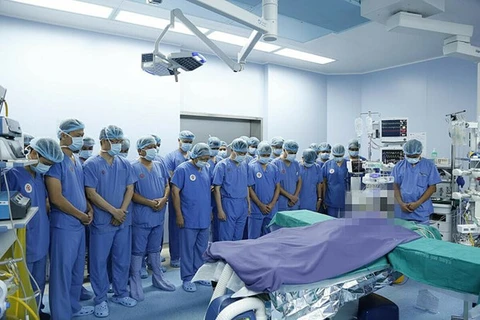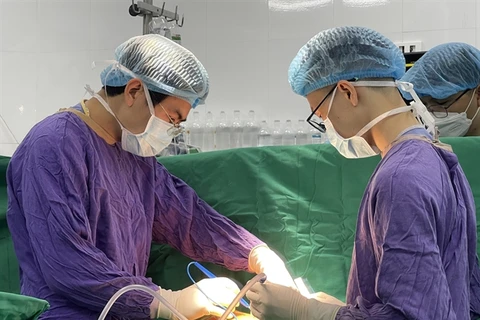 Doctors at Cho Ray Hospital transplant a kidney taken from a deceased donor on February 26. (Photo courtesy of the hospital)
Doctors at Cho Ray Hospital transplant a kidney taken from a deceased donor on February 26. (Photo courtesy of the hospital) It then performed the country’s first successful kidney transplant from a brain dead donor in 2008.
It has done more than 1,060 kidney transplants in the past 30 years, with organs taken from deceased donors accounting for only 5%, Assoc Prof Thai Minh Sam, head of the hospital’s department of urology, said.
Complex procedures such as living paired-kidney exchange transplant and ABO-incompatible living-donor kidney transplant have also been successfully conducted, helping more and more patients with kidney disease to get a transplant, he said.
“The hospital has successfully performed all [known] kidney transplant procedures.”
Kidney transplant recipients have had more than 300 babies subsequently in the past 30 years, he added.
Dr Pham Thanh Viet, head of the hospital’s general planning department, said kidney, liver, heart, bone marrow, and corneal transplants and skin grafts have been done.
The hospital plans to send doctors to developed countries to learn lung and intestine transplant procedures, he said.
Organ procurement and transplantation network
More than 1,110 organ transplant surgeries have been conducted so far at the hospital, including nine heart transplants, Dr Du Thi Ngoc Thu, head of the organ transplantation coordination unit, said.
But transplants from living donors accounted for more than 95%, she said.
There is a severe shortage of deceased donors, she said.
“The demand for organs continues to exceed supply, and many people waiting for a transplant die every day.
“A single organ donor can save seven to eight lives.”
In Vietnam, thousands of people need an organ transplant every year while hospitals only get organ donations from around 10 brain-dead people, according to the National Coordination Centre for Organ Transplantation.
In 2018, Cho Ray Hospital, Thong Nhat Hospital and Children’s Hospital No.2 signed an agreement for the allocation of donated kidneys for transplants under a project aimed at increasing potential donors and prevent organ trafficking from living donors.
The project developed the first organ procurement and transplantation network in the city.
The country’s first software waiting list registry and organ donation, management, allocation, and transplant was launched last year as part of the project.
Between 2020 and 2022, it received 19,983 registrations for organ donations after death, thrice the number in the previous three years.
Ensuring transparency and fairness in organ allocation at local and national levels is critical, Thu said.
The network would continue to expand to take in other organ transplant centers in the country, she added.
Doctors at Children’s Hospital No.2 successfully transplanted a kidney in a child with end-stage kidney disease with the donor being a brain-dead adult.
The the National Coordination Center for Organ Transplantation and Cho Ray Hospital allocated the kidney from the young brain death donor to the Children’s Hospital No.2 under the system allocation criteria.
The Children’s Hospital No.2 has performed 25 liver, 24 kidney and five stem cell transplants so far, Dr Trinh Huu Tung, its director, said.
It now performs liver and kidney transplant surgeries without assistance from foreign specialists, he added./.
VNA























